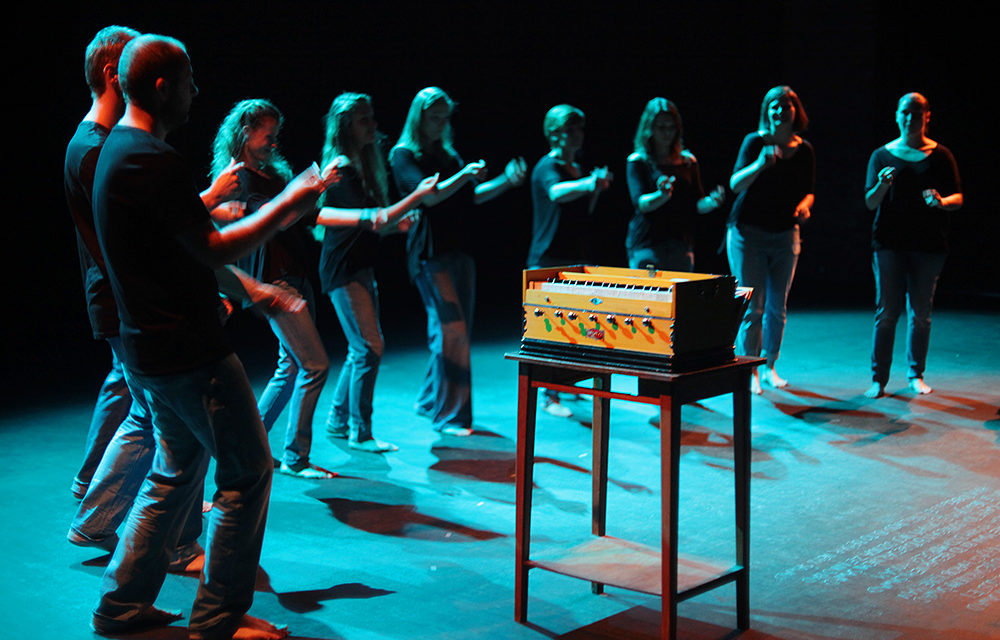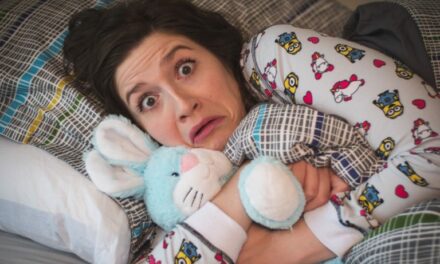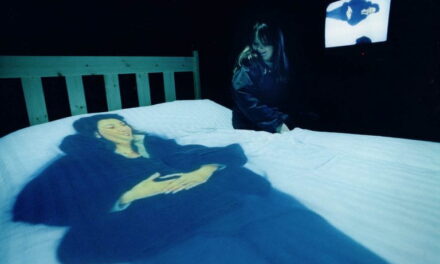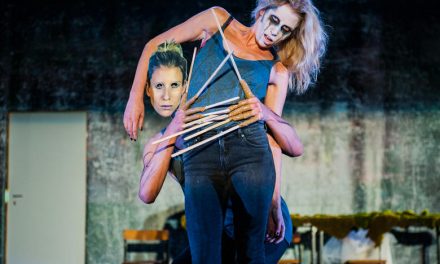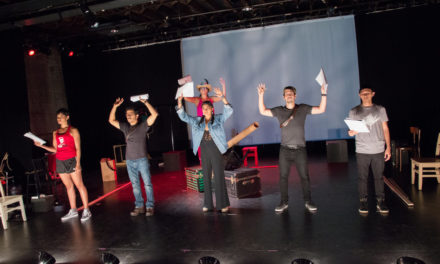Over the five days of the Retro//Per//Spectives festival, the host company Teatr Chorea performed in works ranging from premieres to unfinished works in progress to polished repertoire. Like many Polish theaters, they keep numerous spectacles from their ten-year history in their closet, ready to be toured. But this festival was primarily about recent work: everything created since the last edition of R//P//S (2012). Guest and visiting performances occurred throughout.
This piece is the second part of an ongoing series: the previous installment can be found here. I’ll rewind the first day of R//P//S in a series of five snapshots from PM to AM. By overturning time like an hourglass, I’m trying to reproduce the dizzying atmosphere of festival ebullience.
R//P//S 2014, Day 1: Thursday, August 21, 2014
V. Time: Evening: Out of Joint
I reel up Piotrkowska to Piłsudskiego in the dim light. The fractal-multiplying patterns of the Rytm języka (Rhythm of language) concert have left my head a wobble. Isolated sound-clips–bicycle wheels, high heels on uneven cobblestones–seem to be forming one of composer Krzyżanowski’s sound-bricolages.
I stand at my bus stop, just outside the Galeria Łódzka mall. Couples are lounging, enjoying the end of summer. I bump into Chorea singer Aleksandra (Ola) Szalek: that silly joy when you meet a fellow actor, unplanned, outside the theater, like unlocking a treasure in a video game. She and her friend amble onward on the concrete.
The bus can wait. I go into the Galeria H&M to make an emergency purchase familiar to theater people worldwide: cheap, clean clothes. No time to do laundry before Gilgamesz tomorrow. Afterwards, I find a yellow bus-vessel to lurch home, along Piłsudskiego’s construction-torn single lane. Still diffracted by Rytm języka, I almost sleep through my stop.
IV. 6 PM: Rytm języka (Rhythm of language)
We climb black stairs to the orange-upholstered chairs of Art_Inkubator’s new theater space. The audience fills in and the lights go out: the sounds begin.
Still in darkness, clattering bursts of clap-stomping begin. This piece is titled Whispers of the Night. It’s like hearing popcorn on the stove. Tense intervals of silence. Lips pop and smack: the audience titters. Clap-clap. Stomp. (Frightening pause.) Clap.
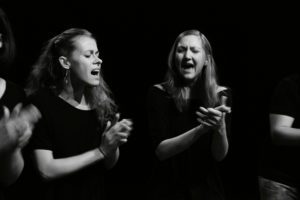
Rytm Języka by Chorea Theatre (2014). Muisc by Tomasz Krzyżanowski, Performers: Maciej Bednarek, Joanna Chmielecka, Hubert Domański, Sandra Gierzek, Dominika Jarosz, Joanna Kłos, Milena Kranik, Dominika Krzyżanowska Gorzkiewicz, Tomasz Krzyżanowski, Kuba Pałys, Justyna Sobieraj-Bednarek, Elina Toneva. Photo by Chorea Theatre.
Lights up: composer and choir director Tomasz Krzyżanowski stands stage right of a semicircle of black-shirted singers, with his yellow harmonium on a stand. Three men, eight women, all barefoot, standing, and wearing jeans. The black floor before them is covered with the words of every song in the piece, written in white chalk capitals, facing the performers. The upside-down text makes it appear that the performers are on the other side of a mirror. There’s Polish, Ancient Greek, Akkadian, and several tongues invented by Krzyżanowski (“inspired by Balkan languages,” or “inspired by West African languages.”)
The first two songs feel embroidered to me. Elegant. The notes drip as if from a wet tree–the raindrops do not cohere. It is impressive, flawless. But with these singers, I expect–because I have seen them deliver it often–both musical complexity and tsunamis of feeling. However, the mood of the concert becomes more emotionally resonant. Nelevidali (one of Krzyżanowski’s invented languages, “inspired by Balkan languages”) pulses energetically. Soprano voices throb like strings being twanged.
In the moving Birdanbire, with text in Turkish by Orhan Veli Kanik, the intricacies relax. Individual syllables are given space. “…there was love, all of a sudden; happiness, all of a sudden.” There is a comprehensible, evenly paced unison before the harmonies accumulate underneath. The room is humming, glowing with sound; my eyes swim. From this point forward, I am with them.
The concert alternates between two modes:
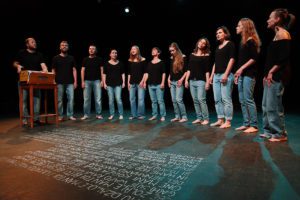
Rytm Języka by Chorea Theatre (2014). Photo by Chorea Theatre.
(1) Humorous, belabored rhythmical puzzles, the tangled math of time signatures. Ciut ciut speeds up till it devours itself with speedy hiccups. Sometimes the singers don’t sing at all, but merely clap and stomp. They are the percussion instruments in Krzyżanowski’s drumkit; at one point, he takes a solo by tapping on his chest.
(2) Swelling emotion punctuated by pelting, loud refrains. Cries and shrieks, a style that evokes folk and traditional singing. The folk world dominates Niktos, an “Orphic hymn” to Kypris (Venus) from the 2nd-3rd century BC, where the hypnotic “senna, senna, senna” is repeated over an open fifth. This creates a cavernous sense of the ancient, something Chorea always does well.
Nelevidali, Sikunima, and Niktos have memorable refrains: I can tune in and understand. However, many songs are overlaid with rhythms like a page of differential equations. The technical virtuosity does not always connect to a story for me. But why am I casting around for narrative? Isn’t Krzyżanowski trying to expand how his audience listens: to argue for rhythm being a language itself?
Some post-Grotowski work can feel heavy: reliant to the point of predictability on sincere feeling. Based on Rytm języka, I would now characterize Krzyżanowski as departing from that reliance on emotionality. His musical prisms are light, watchable, and dynamic, like a midair mobile. The piece does not take itself too seriously; it trips and tumbles. There is movement and a natural sense of humor. But there is little restfulness.
It has ended itself. Shrieks and foot-stomping: the risers shake. Two encores: Sikunima, with Joanna Chmielecka’s sunlight soprano over a pebbly stream-bed of sound, and a body-percussion clapping sequence, Language of Rhythm II, which includes the singers galloping like horses. The audience laughs heartily.
If Chorea has sometimes tried to put the chorus back together–to reconstruct the time before that pesky Thespis stepped out of the line of actors–then Krzyżanowski is now trying to access a time when there was only rhythm, to the time when languages were being invented. Is this a unity of music, dance, and text? Yes, but the role of text is sonic, not lexical. The rhythm is telling the story; the words are along for the ride.
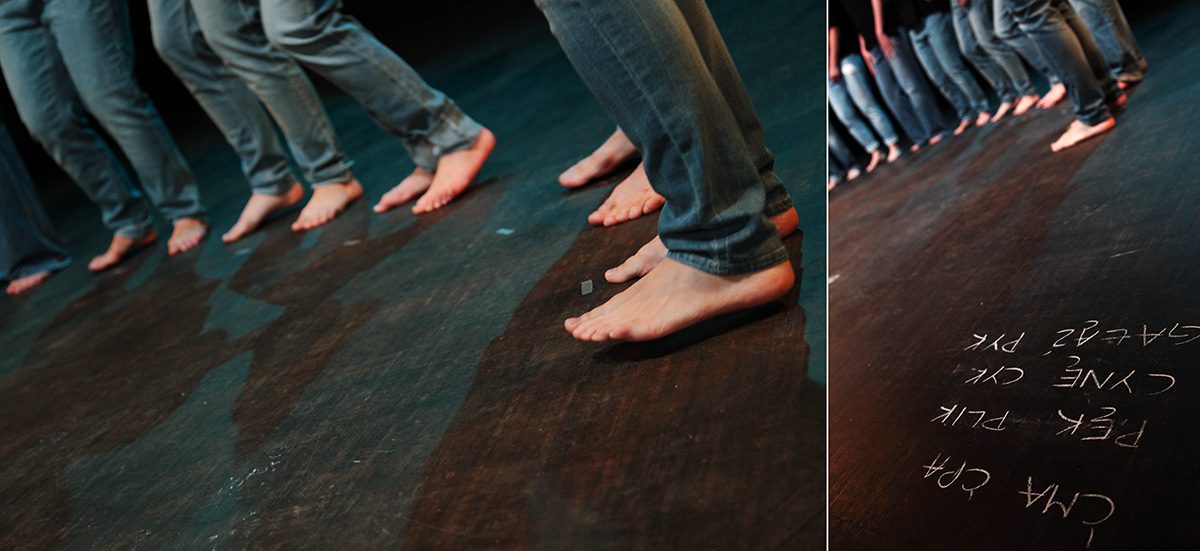
„Rytm Języka” by Chorea Theatre (2014). Photo by Chorea Theatre.
III. 4:30-5:30 PM: Vidomi, Hedda Gabler, and Festival Mayhem
We bustle out of the gallery to go to the first performances of the festival, programmed simultaneously: Janusz Adam Biedrzycki and Magdalena Paszkiewicz’s Vidomi, a work showing of a community-based dance piece with blind and visually impaired Łódź residents, and a visiting Hedda Gabler from Norway’s Visjoner Teater, directed by Tonje Gotscalksen, in the nearby open-air museum of Łódź’s Central Museum of Textiles, around the block.
At the Art_Inkubator, I encounter old friends from the Wielki Chór Młodej Chorei (The Great Choir of Young Chorea), the choir that grew out of 2011’s Oratorium Dance Project. These energetic singers, some still in high school, are quick to greet you with a hug. I have missed them. They tell me about a concert of Bulgarian music on Sunday, Engi vengi vitalengi, led by Chorea actress Elina Toneva. They promise there will be both familiar repertoire and also new songs.
We are accosted by Chorea director Tomasz Rodowicz, who asks us to please go around the corner to Hedda Gabler. He is worried that the visiting piece is under-attended. I obey, with other Oratoriumites. But when we get to the courtyard entrance on ul. Milionowa, at the gateway of the Textile Museum, the festival staff tell us not to panic: there is already an audience.
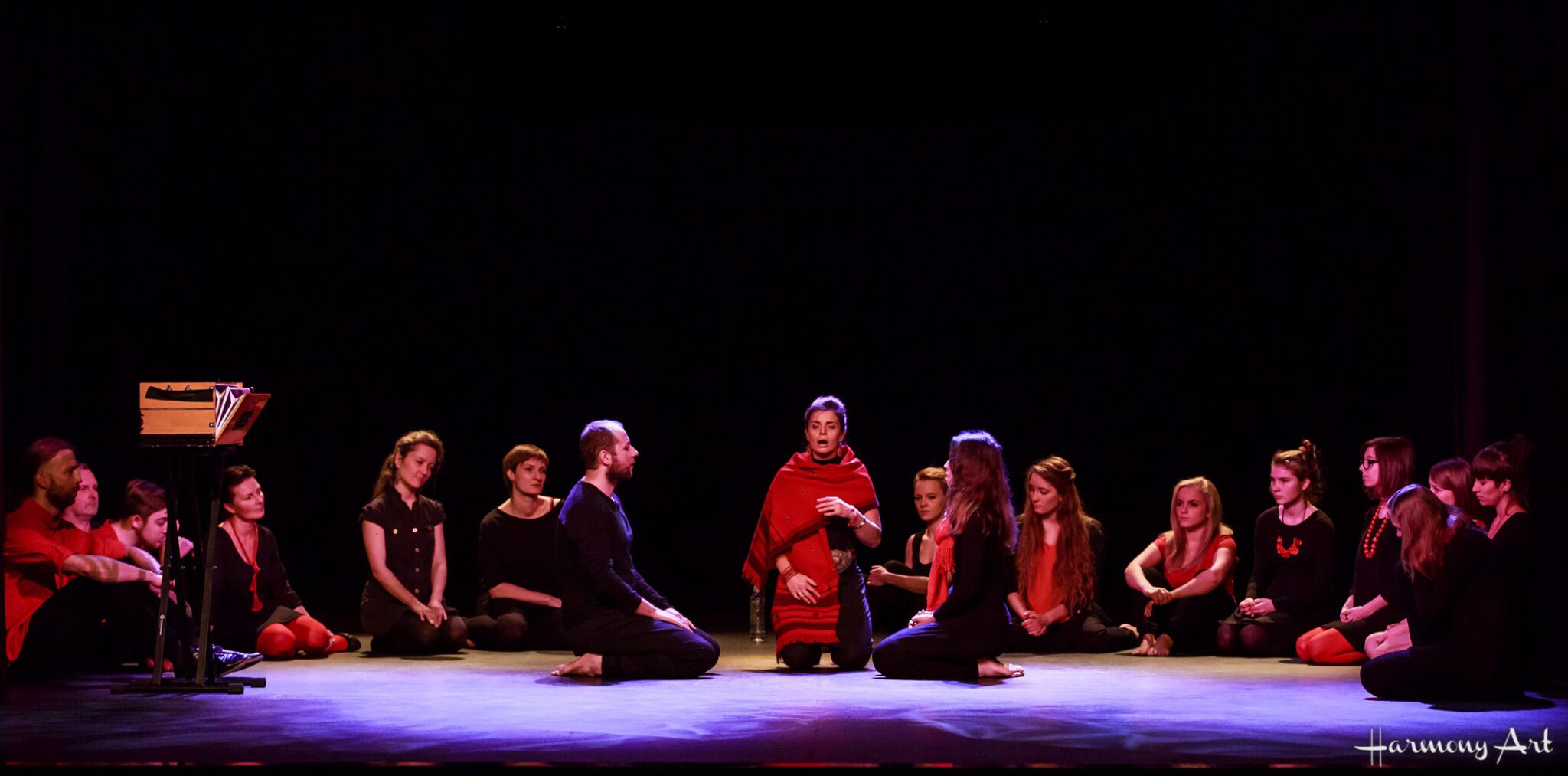
Engi vengi vitalengi by Wielki Chór Młodej Chorei (The Great Choir of Young Chorea), Photo by Harmony Art
Still, more Rodowicz-redirected singers accrue, many wearing green buttons that say ARTYSTA (artist). A passerby takes a spill off a motorbike on ul. Milionowa. Festival volunteers run to help, reinstate the unhurt biker on the bike, and give out information about the performances.
Unfortunately, it turns out it’s not possible to see both Hedda and the premiere of Rytm języka (Rhythm of language). I have to return to the Inkubator. This kind of schedule snafu is part of every festival, but I’ve never before bungled the very first show I was going to see on the program.
Biedrzycki sees me and asks me what I thought of Vidomi. I have to tell him I missed it, but vow to return for his fall premiere. He says it’s their third work showing, and they are doing well, but the noise made by the feet of the television crew was a minor distraction to his blind performers, who need to hear one another. This idea of silence being the through-line of navigation is interesting to me. I’m looking forward to seeing–and hearing–the piece in October.
II. 4 PM: Festival Opening
Chorea’s staff, actors, friends, and festival attendees gather on the second floor of the newly refurbished Art Inkubator for the official festival opening. A gallery, punctured by gray steel poles, has sprung up in this converted factory building. The room is walless, open, wide as the entire Inkubator. I can look through the crowd and see the exhibit photographs fractured between us on every side. In one corner, Chorea producer-singers Pola Amber and Maja Justyna are introducing their babies to one another: Sonja and Zofia, born days apart. We all imagine the next generation of the company.
Artist-curators Zofia Dworakowska, Paweł Korbus, and Dorota Porowska have mounted an exhibition, “Miasto w działaniu” (The city in action), which includes photographs, documentation, and art objects from or inspired by two socially concerned projects: (1) “Expeditions” (urban social interventions in Spain, Poland, and France); and (2) Chorea’s own “ATTENTION Humans! Urban Tension,” comprising cooperations with communities seen as marginalized, including the elderly, children, blind people, and homeless people. Some “ATTENTION Humans!” performances will be presented at R//P//S 2014, such as Vidomi, with blind performers.
Director Tomasz Rodowicz takes the stage to greet the friendly crowd. Since this festival marks ten years of Chorea’s existence, he nods to the company’s history, even mentioning the drama-ridden emergence from the Gardzienice ensemble, but says that there is no need to get into all that. Instead, he wants to share two brief anecdotes, two “scenes” from Chorea’s life. First scene: after a recent theatrical cooperation with homeless Łódź residents, Wszędodomni (hard to translate, but “Home everywhere,” roughly) one of the homeless men in the piece actually got one of the Chorea actors a short-term job in the city.
Second scene: a Łódź presentation of material related to Golgotha Picnic–the controversial play which has been protested frequently by conservative Christians, and had its June 2014 performances at Poznań’s Malta Festival canceled.
In response, many artists throughout Poland presented portions of the play or materials about the controversy. When such a presentation happened in Łódź, on one side of the street, a group was singing church music, to protest.
But the other side, at the theater, one of the Chorea actors was happily singing along with the protesters, because this actor grew up in a traditional family and loves Catholic liturgical music. The audience laughs. Rodowicz is subverting expectations. Part of Chorea’s social-artistic mission is to undermine the idea of the “other,” to make connections between people from disparate but related worlds.
After this speech, he is presented with the Gloria Artis Medal for Cultural Merit from the Polish Ministry of Culture. Applause. It’s time for audience members to spill out of the gallery into the spaces at ground level. The performances are about to begin.
I. Morning and Early Afternoon
At home, I do vocal exercises and fret about the remount of Gilgamesz tomorrow. My throat is still chalky from a recalcitrant virus: my singing is unpredictable. When we performed this piece, last September, the music was in my body. Now, I’m afraid it’s not.
But my stewing is interrupted: Tomasz Krzyżanowski calls me to ask for a translation of a few lines from Rytm języka (Rhythm of language) for tonights’ program. I read his email, in Polish, and send him the brief English text. It’s about a baby elephant enjoying a rainstorm. (The “original” of this fragment is a language the composer invented himself. He had to translate it into Polish for me to then translate it into English.)
I practice the Gilgamesz songs until it’s time for me to head to the festival. My voice is regaining volume. Barring a catastrophe, I might be able to sing tomorrow.
Dara Weinberg is a writer/director, originally from Los Angeles. She studied Polish theater on a Fulbright grant from 2011-2013; she now lives in Kraków. She is working on a book about her experiences with Poland, theater, and Teatr Chorea.
This post was written by the author in their personal capacity.The opinions expressed in this article are the author’s own and do not reflect the view of The Theatre Times, their staff or collaborators.
This post was written by Dara Weinberg.
The views expressed here belong to the author and do not necessarily reflect our views and opinions.

